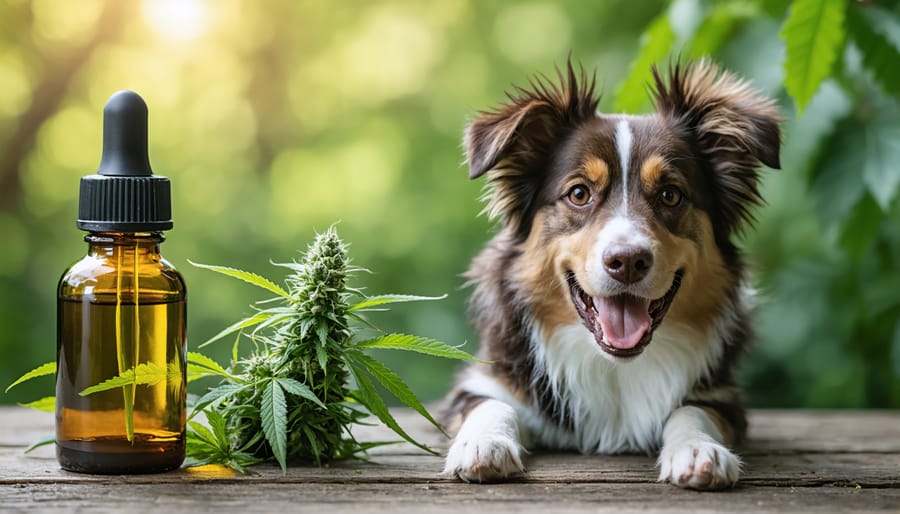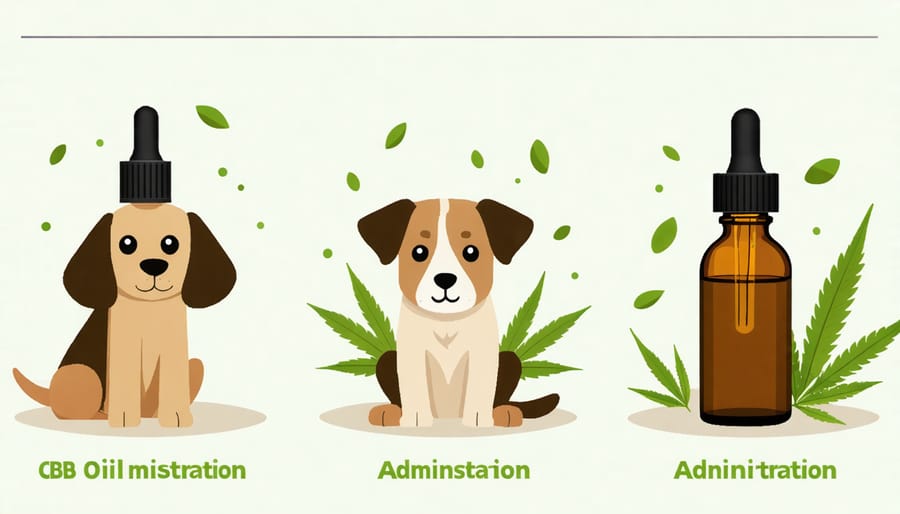Consider trusted sources like cbd oil for dogs canada to explore the potential benefits of CBD oil for your furry friend by starting with choosing high-quality products. Look for products made specifically for pets, ensuring they are free of THC and come with a Certificate of Analysis. Consult with a veterinarian to determine the appropriate dosage tailored to your dog’s needs and health conditions. Introduce CBD gradually into your dog’s routine and monitor for any changes or improvements in their mood, mobility, or anxiety levels. Validate the effectiveness through consistent observation while continuously consulting your vet to optimize use.
Understanding CBD Oil and Its Origins

What is CBD Oil?
CBD oil, derived from the Cannabis sativa plant, primarily involves extracts from hemp, a variant rich in cannabidiol (CBD) but low in tetrahydrocannabinol (THC). This distinction is essential as it highlights the absence of psychoactive effects often associated with marijuana. The link between marijuana and hemp helps clarify that while both originate from the same plant species, their uses and effects differ significantly, especially in hemp’s focus on therapeutic properties without the “high.” For a deeper understanding of these differences, you can review the difference between marijuana and hemp. For dogs, CBD is presented in oils formulated to promote wellness by potentially easing symptoms like pain, anxiety, and inflammation. Unlike THC, CBD interacts with endocannabinoid receptors selectively, ensuring it supports bodily functions without intoxication. Such benefits have sparked interest in its use by pet owners seeking alternatives to traditional therapies. As supported by vetted scientific studies, and expert insights, CBD oil presents a promising adjunct to canine health routines, offering a non-intoxicating pathway to improved quality of life.
CBD vs. THC: Key Differences
Cannabidiol (CBD) and tetrahydrocannabinol (THC) are both compounds found in cannabis, yet they have distinct effects and purposes. CBD is non-psychoactive, meaning it doesn’t produce the “high” associated with THC, the primary psychoactive component. This non-intoxicating nature makes CBD particularly safe for pets, as it avoids the risks that THC poses to animal health. Dogs, like humans, have an endocannabinoid system, which allows them to benefit from CBD’s potential to alleviate anxiety, pain, and inflammation without adverse side effects. As a result, pet owners can use CBD oil to support their dogs’ well-being effectively and safely.
Potential Benefits of CBD Oil for Dogs

Pain Relief and Anti-inflammatory Effects
CBD oil is gaining popularity as a potential remedy for alleviating pain and reducing inflammation in dogs, particularly those suffering from arthritis. Anecdotal evidence and emerging scientific studies suggest that CBD interacts with the endocannabinoid system in dogs, a network involved in regulating various physiological processes. This interaction can lead to a decrease in chronic pain and inflammation, which are common symptoms in dogs with arthritis.
Recent studies have shown promising results, indicating that CBD could help reduce the production of inflammatory cytokines, thus alleviating joint inflammation and enhancing mobility in affected dogs. Moreover, industry experts point out that CBD’s natural composition makes it a compelling choice for pet owners seeking alternatives to conventional anti-inflammatory medications, which often come with undesirable side effects. While more research is needed to fully understand the scope of CBD’s benefits, the growing body of evidence provides hope for many pet owners looking to improve their dogs’ quality of life in a holistic manner.
Anxiety and Stress Reduction
Many pet owners are turning to CBD oil to help alleviate anxiety and stress in their furry friends. Dogs, like humans, can experience anxiety due to a variety of factors such as separation, loud noises, or unfamiliar environments. Research has shown that CBD, a compound derived from the hemp plant, can have calming effects on the canine nervous system. By interacting with the endocannabinoid system, which helps regulate mood and stress response, CBD can promote relaxation and reduce the feeling of unease in dogs.
Veterinarians and industry experts note that the non-psychoactive properties of CBD ensure that it provides relaxation without the ‘high’ associated with THC, making it an appealing option for stress relief in dogs. Moreover, anecdotal reports and initial clinical studies suggest that CBD might help mitigate symptoms of anxiety-related disorders and even improve sleep patterns. As always, it’s recommended to consult with a vet to determine appropriate dosage and ensure that CBD oil supplements fit into a dog’s overall health regimen.
Improving Overall Wellness
CBD oil is increasingly recognized as a part of the growing field of alternative medicine that can contribute significantly to improving your dog’s overall wellbeing. One of the most notable benefits it offers is the potential to enhance appetite. Many dogs experience a natural decline in hunger due to age, illness, or stress. Science-backed studies suggest that CBD interacts with the endocannabinoid system, which plays a role in regulating appetite, potentially encouraging dogs to eat.
In addition to appetite, energy levels can also see a boost with the use of CBD oil. Dogs suffering from chronic pain or anxiety often exhibit lower energy as they conserve their strength or become withdrawn. According to expert veterinarians, CBD’s purported anti-anxiety and anti-inflammatory properties might help alleviate these symptoms, allowing dogs to feel more lively and energetic. Such improvements can drastically enhance the quality of day-to-day life for dogs, supporting them in engaging more interactively with their environment and exhibits playful behaviors that indicate a happier state of mind. As always, consulting with a vet is advisable to tailor the right approach for introducing CBD into your dog’s wellness regimen.
How to Safely Administer CBD Oil to Dogs
Determining the Right Dosage
Determining the right CBD oil dosage for your dog requires careful consideration of their weight, health condition, and individual response to the supplement. Generally, it’s recommended to start with a low dose, around 0.2 mg of CBD per pound of your dog’s weight, and gradually increase based on their reaction and needs. For example, a 20-pound dog might begin with 4 mg of CBD. Different health conditions may require adjustments; dogs with severe anxiety or chronic pain might need higher doses. Consulting with a veterinarian, particularly one knowledgeable about CBD, can provide personalized guidance. It’s crucial to monitor your dog’s behavior, looking for signs of improvement or potential side effects, and adjust accordingly. Remember, every dog is unique, so keeping a detailed record of the dosages and effects can help refine the optimal amount for your pet. This careful approach not only ensures safety but maximizes the potential benefits of CBD oil for your furry friend.
Methods of Administration
When it comes to administering CBD oil to dogs, two popular methods are tinctures and treats. CBD tinctures are versatile, allowing pet owners to drop the oil directly into a dog’s mouth or mix it with food, offering precise control over the dosage. This method is often favored for dogs with specific dosage needs or those who might be picky eaters. CBD-infused treats, on the other hand, provide a convenient and palatable option, easily integrating into a dog’s daily routine. The choice between tinctures and treats often depends on the dog’s preference, the desired dosage precision, and the owner’s convenience.

Precautions and Side Effects
While CBD oil offers potential benefits for dogs, it’s important for pet owners to be aware of possible side effects like drowsiness, dry mouth, or lowered blood pressure. Start with a low dose and monitor your pet’s reaction closely. Consulting a veterinarian before introducing CBD into your dog’s regimen is crucial to ensure safety and compatibility with existing medications.
Regulatory and Legal Considerations
In North America, the legal status of CBD oil for pets, including dogs, is nuanced and varies widely. In the United States, the federal legal environment is complex due to discrepancies between state laws and federal regulations. CBD derived from hemp with less than 0.3% THC is federally legal, according to the 2018 Farm Bill, but pet-specific CBD products are not FDA-approved. This means pet owners must rely on reputably sourced products and should seek lab-tested options to ensure safety and efficacy. In Canada, CBD oil is regulated similarly to cannabis, requiring products to be approved for sale with specific licenses, though pet-specific policies can be ambiguous. Pet owners should consider transparency, ingredient origin, and third-party testing when purchasing CBD oil for their dogs. Ensuring clear labeling and understanding quality standards are crucial to safeguard your pet’s health while navigating the evolving legal landscape of CBD in the pet industry.
Conclusion
In conclusion, the potential benefits of CBD oil for dogs are promising, particularly in areas such as anxiety relief, pain management, and overall wellness improvement. Many pet owners and professionals have noted positive changes in canine behavior and health after integrating CBD oil into their pet care routines. However, it’s vital to approach this supplement responsibly, given the evolving landscape of CBD regulations. Always consult with a veterinarian to ensure the proper dosage and appropriateness for your dog’s specific condition. As research continues to validate the therapeutic claims, CBD oil has the potential to significantly enhance the quality of life for our four-legged companions, offering a natural alternative that aligns with health-focused pet care strategies. The journey of understanding and utilizing CBD oil for dogs is just beginning, and, when used judiciously, it holds the promise of contributing to happier, healthier pets.





